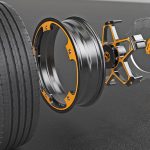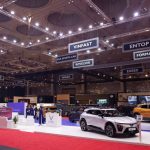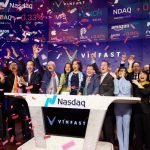“Newcomer” welcomed by US government
VinFast has caught the attention of the state of North Carolina as the company seeks a location to build a factory in the United States.
State officials have been working for several years to attract an automobile manufacturer to establish a plant in Chatham County. Despite being a young company, VinFast, with its ambitious plans, has garnered billion-dollar investments and emerged as a promising startup from Vietnam.

Within just 6 years since its establishment, VinFast, an innovative electric car manufacturer, has achieved remarkable progress. The company has not only launched modern car models through partnerships with industry giants like BMW and top Italian designers, but has also successfully attracted top talents in the automotive industry. VinFast is poised to compete with Tesla and other major American car brands in the domestic market.
The Governor of North Carolina, Roy Cooper, praised VinFast’s decision to build a factory and emphasized that it is the largest economic development project in the state’s history. US President Joe Biden also sees this as “a testament to the effectiveness of his economic strategy.”
VinFast’s bold move to list on the Nasdaq stock exchange and its ambitious plans have garnered significant attention. In August of this year, VinFast’s stock price skyrocketed, pushing its market capitalization to surpass that of Ford and GM combined.
With an established car manufacturing plant in Vietnam, VinFast has already sold approximately 10,000 electric cars worldwide in the first half of this year. VinFast considers itself a “newcomer” in the automotive industry and is actively seeking large investments to support its growth.
VinFast’s received support demonstrates the US government’s commitment to promoting domestic production and clean energy technology. The US has allocated tens of billions of dollars to support electric car manufacturers, solar energy batteries, and mineral processing. In addition, state and local governments are providing financial support to these activities.
While VinFast has not yet received a federal loan, it is benefiting from state and county incentives, including subsidy payments and hundreds of millions of dollars from the state for improving roads and infrastructure near the new factory location.
Governor Cooper told The Wall Street Journal that he trusts VinFast’s commitment. With an electric car factory in Chatham County, North Carolina has become a focal point for the clean energy economy.

VinFast’s Global CEO, Le Thi Thu Thuy, expressed confidence in the company’s appeal to key markets. She believes that the US market appreciates brands that rise from humble beginnings and dare to compete with established players.
One advantage VinFast has in expanding into the North American market is that it is not a Chinese brand. Although well-known Chinese electric car brands, such as BYD, are expanding globally, many have yet to enter the US market due to high import duties and escalating US-China tensions.
In the US, VinFast has received a warm welcome from lawmakers across the political spectrum. Moreover, Vietnam is considered a friendly trading partner of the US.
Long-term commitment to the US market
When billionaire Pham Nhat Vuong, founder of Vingroup, decided to invest in VinFast, his vision was to build Vietnam’s first global brand. Vuong, Chairman of Vingroup and Forbes’ richest person in Vietnam, holds over 98% of VinFast’s shares.
Vingroup is making significant investments to acquire expertise and foreign technology. VinFast’s first CEO, Jim DeLuca, brings with him 37 years of experience from General Motors, where he served as Executive Vice President of Global Manufacturing.
In just 21 months, the company has completed the factory and successfully developed three car models, a much faster pace than traditional car manufacturers. However, starting from last year, VinFast has stopped producing internal combustion engine cars and transitioned to electric vehicles.

VinFast cars are currently produced at a highly automated complex in Hai Phong, Vietnam. Many components are manufactured in-house, and the factory relies heavily on over 1,000 robots for tasks such as welding car parts together. This automated approach sets VinFast apart from competitors and significantly reduces labor costs.
VinFast also benefits from favorable export conditions, thanks to free trade agreements between Vietnam and markets such as the European Union. The company is currently selling cars in the US, Canada, Vietnam, and plans to enter the EU market soon.
The factory has a capacity to produce up to 300,000 electric vehicles per year, but this year VinFast plans to manufacture only 40,000-50,000 cars. GSM, a major shipping company, is a key partner of VinFast and has played a crucial role in promoting electric cars in the Vietnamese market.
“Our goal is to have VinFast electric cars on the streets of Hanoi as quickly and widely as possible,” said David Mansfield, VinFast’s CFO.
In July, the company broke ground on its factory in North Carolina, which is expected to begin production of electric cars in 2025. The US factory will be similar to the Vietnam factory, with a high level of automation and a local supply chain to maintain flexibility. Customers who purchase VinFast cars manufactured in the US may be eligible for a $7,500 electric vehicle tax credit.
In the US market, VinFast positions itself as a premium brand. The VF 8 City Edition model has a starting price of nearly $50,000. The company has already opened 13 showrooms in California and plans to open 3 additional showrooms.
“To be an integral part of the US economy and demonstrate VinFast’s long-term commitment to this market, we need to make substantial investments,” Thuy said.
According to The Wall Street Journal






























![[CAR REVIEW] Rolls-Royce Spectre: A Symphony of Luxury](https://vnauto.net/wp-content/uploads/2023/10/xehay-rrspectre-30082023-1-150x150.jpg)














